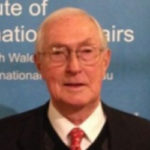The North Korean launch of four missiles towards the west coast of japan, reportedly accompanied by boasts about a coming ability to hit the continental United States with an ICBM, has raised the level of tension in North East Asia.
North Korean spokesmen have claimed that the launch was in response to the annual large US/ROK combined military exercises, which the North claims simulate an attack on its territory. The US and ROK see them as keeping the North in check.
In part of a long press conference the Chinese Foreign Minister, Wang Yi, positioned China as above the battle, describing the United States and North Korea as two trains heading towards each other on the same track, and China as waving a red warning flag. He proposed a deal under which North Korea would cease its missile launches and the US its exercises with the South, and the six-party peace talks would resume. He said that “peace is still possible to achieve”.
He also strongly criticised the US and South Korea for their plan to install a powerful missile defence and radar system, THAAD, in South Korea, to defend that country against a North Korean missile attack, on the grounds that it will have the capacity to impact on China’s security. (THAAD is of course a defensive, not an offensive, system, and the US already has powerful radars in Japan.)
Diplomacy is active. A Vice-Chairman of the North Korean Workers’ Party is reported to have made a four-day visit to China, where China’s friendship with North Korea was affirmed. US Secretary of State Tillerson is visiting East Asia. And after a UN Security Council meeting to discuss the missile launches the US, Japanese and South Korean Ambassadors spoke in stern terms of “measures that will make the North Korean regime rue its actions”.
But what could these new measures be? North Korea has stuck to its adventurous course so far despite a wide range of sanctions. Its semi-legal, semi-black market economy is doing quite well, and has clearly managed to produce the resources for the regime’s nuclear and missile programs. What will the outraged nations—in particular the US, Japan and South Korea—do if the North simply continues on its present course, despite some heightening of sanctions?
The insiders’ joke about the situation on the Korean peninsula used to be that it was always critical but never serious. But the North’s missile and nuclear programs have changed that. The North wants these programs to make it invulnerable to attack, “too nuclear to fail”, to quote Scott Snyder, an American expert on North Korea. And it wants direct talks with the US, which the US is not willing to have, on the grounds that they would reward bad behaviour and ignore the role and standing of South Korea.
I don’t think the North would now give up its nuclear weapons program even as a result of direct talks with the United States ( even though it did agree to do that years ago, in an agreement under which it was to suspend its nuclear program in return for the US providing two light-water reactors for nuclear power purposes; the US did not carry out its side of that deal); and I don’t think the bargain proposed by China, equating North Korean missile launches with the US/ROK military exercises, will attract the US if the North Korean nuclear program continues.
So what is to be done? The recent warning to North Korea by US Defense Secretary Mattis is one way of living with North Korea as a nuclear power, i.e. to accept it as such while relying on the United States’ enormous nuclear deterrent power to restrain it. Nuclear deterrence has a good record, viz. the United States and the Soviet Union during the Cold War. It can be argued that accepting North Korea as a nuclear—but deterred—power is a more realistic option at this point than any others that come to mind.
But whether that is acceptable to North Korea’s neighbours, to the US and to the international community really depends to a great extent on the North Korean regime itself. Its actions, and its bellicose and threatening rhetoric, including canvassing nuclear attacks on American cities, do not amount to a situation that others can easily live with. Kim may be deemed too extreme, or mad, to be sure of deterring.
If North Korean actions and rhetoric continue as they have, and stricter sanctions do not change its behaviour, military options will inevitably be considered. That is not an attractive prospect, particularly given North Korea’s situation so close to China, Japan and South Korea, where Seoul, near the border with the North, is very exposed to conventional attack. But continuing with North Korea on its nuclear and missile track is not attractive either, particularly for the Trump Administration, given that it may feel that, so early in its term, its response to North Korea will be seen as a test of its international weight and credibility. Trump himself has said that a North Korean nuclear ICBM capability “will not happen”.
Altogether indeed a serious situation, with no attractive outcomes apparent.
Geoff Miller was Director General of the Office of National Assessments and Deputy Secretary of Foreign Affairs. He was Ambassador to the ROK and Japan, and High Commissioner to New Zealand.




